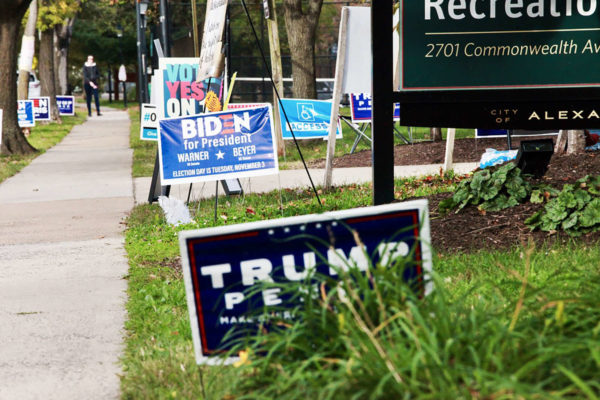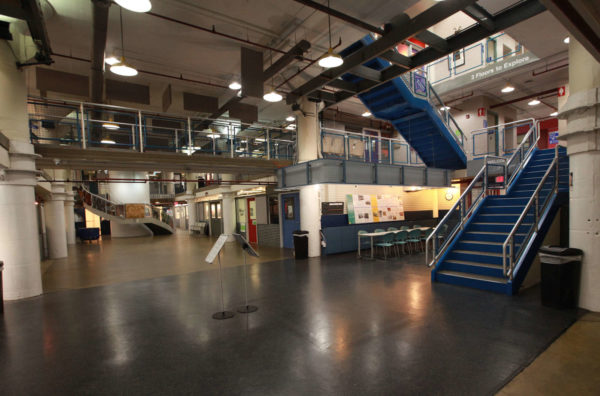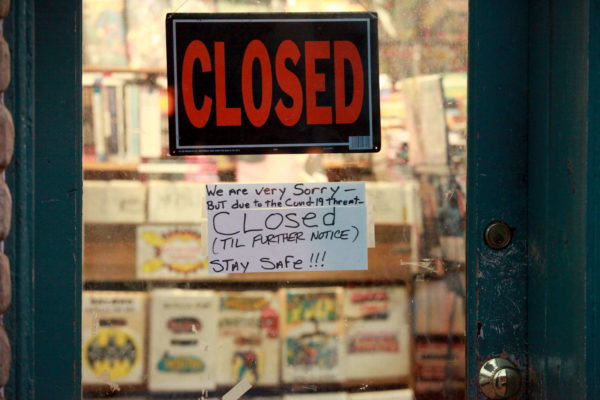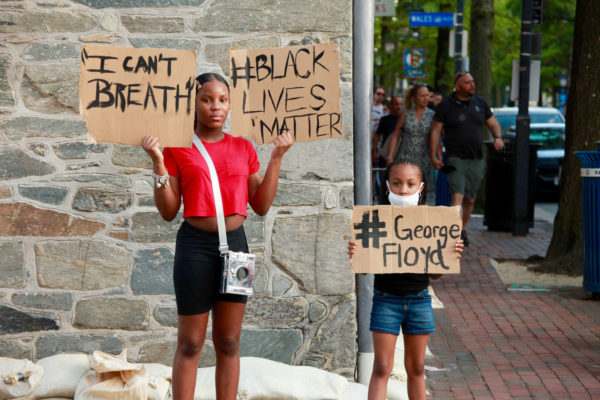Last week, Agenda Alexandria sat local Republicans and Democrats together at a table to hash things out and try to find a way forward.
The round table discussion featured former Delegate Mark Levine and Legislative Director Sarah Taylor voicing the more Democrat-aligned viewpoint. On the Republican side was The Family Foundation Director of External Relations Michael Leaser and Michael Ginsberg, vice president of CACI and leader of the Suburban Virginia Republican Coalition.
One of the main points of discussion was the Dillon Rule, a longtime nemesis of local governance that the Democrats at the table should be a point of agreement between both Republicans and Democrats but hasn’t been.
“When I first learned about what conservatives were, I’d heard that conservatives believe in local control and elected officials closest to the people should be able to decide these things: that’s a load of hooey,” said Levine. “That’s not true, at least not in Virginia. I guarantee you the Republicans do not want local control for Alexandria, they want power, and if they control the state levers they will use that power.”
Taylor said her job in Richmond is to serve the interests of the city and not be a “party hack”, but said the Dillon Rule has been a source of frustration for local advocates even though it does provide the legislative director with a degree of job security.
“I will never understand why a legislator from far southwest Virginia cares one iota about something we’re going to do in Alexandria,” Taylor said.
Taylor said the main argument she hears from Republican legislators in favor of the Dillon Rule is keeping Virginia laws from splintering dramatically along local lines. Levine said the issue isn’t local vs state control, but which localities are granted more or less authority based on their political alignments.
Ginsberg acknowledged those divisions exist but said that for some Republicans the Dillon Rule exists as a way of holding the line on what he called “principal issues.”
“Some of that is about principal issues, like gun control, where people feel strongly about something in principal,” Ginsberg said. “That’s an issue where you’re down so far away from Alexandria you might say ‘this is a matter of constitutional principal and I’m not going to support that.'”
Still, Ginsberg said there are issues that are very in the weeds where localities understandably “don’t want the camel’s nose in the tent.”
Leaser said he was generally in favor of more of that authority being shifted to localities.
“I am a small-government conservative,” Leaser said. “As much as possible, when it makes sense, local governments know their people better than the state. That might not be a popular opinion among Republicans here, but I think that is a conservative position.”
Leaser said he’s worked across the aisle on other issues, like defeating a casino referendum in Richmond or helping to secure funding for the Martin Scorsese film Silence. Leaser said one area he’s hopeful for collaboration with Democrats is expanding charter school options in Northern Virginia. Leaser said many families have issues with public schools and a “good, robust charter school system in Alexandria” could help diffuse some of the tensions about what is taught in classrooms.
Reaching across the aisle is something Ginsberg said Governor Glenn Youngkin will need to do more if he wants to achieve his aspirations for higher office.
“When you can reach across the aisle and find a middle ground, finding those issues it pays a lot of dividends from a political perspective, but it also sets lane markers for where we can get things done in Richmond,” Ginsberg said. The other thing in this, and this is a thing a lot of activists will tell you: Youngkin is a man of some ambition. I don’t think this is going to be his last elected office. I think he would love to have an opportunity to prove to voters that ‘I can work across the aisle and I can get things done with both sides.'”
Youngkin hasn’t had the best reception in Alexandria so far, but Ginsberg said he’d encourage Youngkin to find common ground with Democrats on more issues.
Levine argued Youngkin has already helped to bring some Republicans and Democrats together, though maybe not in the way he’s intended.
“The tip line, to call the state if a teacher teaches something controversial: every single superintendent in the Commonwealth has signed a letter saying to get rid of that tipline,” Levine said. “He’s brought people together: but against these policies.”
City of Alexandria vs. Commonwealth of Virginia: new governing dynamics https://t.co/h1K6cuQz1n
— Agenda Alexandria (@agendalexandria) March 28, 2022
The underlying idea behind last night’s (Monday) Agenda Alexandria discussion about the Torpedo Factory Art Center is that everyone involved wants the best for the facility. However, there are very divergent ideas about whether stagnation or change will kill the beloved Old Town art facility.
The panel discussion followed months of back-and-forth between city officials and artists over a suite of potential changes to the Torpedo Factory.
Diane Ruggiero, director of the Office of the Arts, and Stephanie Landrum, CEO and President of Alexandria Economic Development Partnership, said the city’s goals are to revitalize the Torpedo Factory by adding new uses to the building that can help make it more financially viable. Landrum and Ruggiero also said they’re working at tying it in more closely with an in-development “arts district” planned for much of North Old Town.
“The Torpedo Factory is a catalyst and I don’t think anyone disagrees with that,” Landrum said. “The conversations we’re having are on how to make sure that continues forward and making sure the physical building that the city owns isn’t prohibiting that type of growth… For this building, we want it to be more vivid and vibrant — to build on the strength of Old Town and the experience.”
Landrum said the plans focus on making the building more accessible and orienting it toward more community interests.
“Discussions are about making the building more accessible and orienting it for the larger community, which has changed,” Landrum said. “We want to make sure people aren’t coming and hanging out at waterfront park or the restaurants and not coming to the Torpedo Factory because they don’t know what’s in there. It’s complicated, but I think everyone’s intent is aligned.”
For the artists, though, there’s a concern that trying to “fix” the Torpedo Factory could be what breaks it.
“My main concern is that I don’t want to lose what the focus of the Torpedo Factory is: open studios with working artists,” said Lisa Schumaier, an artist living in Del Ray. “It’s not looking at a fully formed building, it’s enjoying the craziness of a construction site, it’s that kind of a thing. There’s so much going on in the building that you can come in and see something started, a week or two later it’s in the middle, and a couple of months down the road it’s finished. I think that’s way more interesting to people than a gallery.”
Schumaier said proposals, like putting galleries into the first floor that showcase finished art, shows that city leaders driving the conversation sometimes misunderstand the fundamental appeal of the Torpedo Factory.
Torpedo Factory Art Center founder Marian Van Landingham said that some city discussion of financial viability of the project assumed a more expensive overhaul to the building than what she thinks it needs.
“When you’re talking about renovating the building and how much it will cost, to some degree there are things you think need to be done that don’t need to be done,” Landingham said. “This antique building, this very historic building by its age, and is perfect for the kind of use we put for it.”
There are repairs, like fixing up the restrooms, that Landingham said can be done without closing the art center for two years as is currently called for in city plans. Landrum and Ruggiero said that plans currently in development could see artists relocated to nearby artist gallery spaces being created. Landrum said through development the city is looking at tripling the total number of art spaces across North Old Town, all of which could help house artists if the artists are relocated during renovation.
Landingham argued that such a dispersal could kill the Torpedo Factory.
“I think the worst thing that could happen would be to disperse the artists for two years,” Landingham said. “A lot of them would never come back. It would never recover.”
That dispersal already happened in 1983, Landingham said, and while the Torpedo Factory did recover she said one of the main differences there were that half the artists could stay in the building as it was being renovated and the other half went to a former school building on Fort Hunt Road. But many of those that left never came back, Landingham said.
“If all the artists leave and you don’t have a continuum, you will kill the art center,” Landingham said, “and that may be the purpose for people who want it for real estate purposes.”
In December, the City Council voted to approve a series of guidelines for Torpedo Factory planning, and Ruggiero said her office is currently planning an involved public outreach process that will talk to various stakeholder groups throughout the city to discuss what they hope to see from the Torpedo Factory in the future.
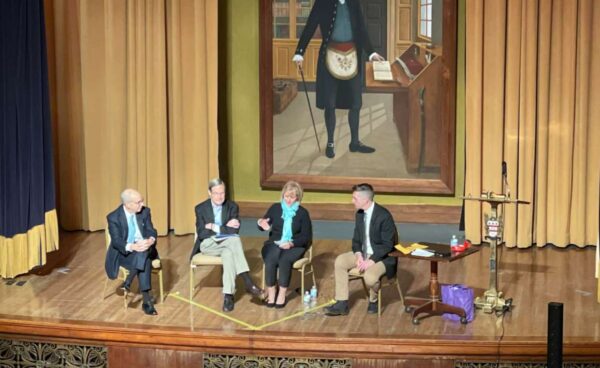
As the City of Alexandria searches for a new manager, several civic leaders recently met with Agenda Alexandria for a behind-the-scenes look at what the job entails and some of its local history.
The discussion, moderated by Alexandria Gazette reporter and local historian Michael Lee Pope, examined the qualifications of the job both as written by the city and from more hands-on experience.
“The city manager is the one who runs the city,” said former City Council member David Speck. “Think about the budget. When the City Council goes through all the work to adopt the budget, whose budget are they adopting? The city manager’s. The process starts with the city manager presenting the budget.”
Philip Sunderland, the city’s city manager for four years, outlined some of the big-picture details of the position. The city manager is appointed by the Mayor and City Council and acts as the “CEO of the executive branch” in that he is in charge of running the day-to-day operations of the city.
Sunderland, a former lawyer, said he took a very analytical approach when he started as city manager but said any prospective hire needs to be just as savvy with handling the political side of the job.
One of the main takeaways is that former City Manager Vola Lawson, who held the office from 1985-2000 and died in 2013, still casts a large shadow over the job and helped shape it into what it is today. When Speck asked the audience to name one city manager from the past, he was met with a chorus of “Vola Lawson” responses. Her name is still represented in various places around the city, like the Vola Lawson Animal Shelter and Vola’s Dockside Grill.
“[Lawson] defined a lot of that role,” Speck said.
Janet Barnett, executive director of Senior Services of Alexandria and former deputy director of the Alexandria Department of Recreation, Parks and Cultural Activities, said Lawson was very intelligent and very connected with the day-to-day operations of the city. Barnett said Lawson would receive daily bulletins from each city department to know about even seemingly minor issues before they could balloon into major problems.
“Vola owned this city,” Barnett said. “She cared deeply about it and she took great responsibility. This city was her baby.”
Barnett said Lawson’s legacy indicates that there’s something to be said for hiring within the city and getting someone who is already familiar with a lot of the inner workings and details of Alexandria.
Speck agreed, saying that there are job requirements beyond what’s on those listed on paper by the city. Speck also noted that, due to the academic limits, Lawson would not have been qualified for the position as it’s written today because she hadn’t had the necessary degrees.
“You can’t reduce the requirements and qualifications to open the field more broadly, but it’s always interested me that someone who has been such a dominant figure in Alexandria history and government is someone who would not meet the modern qualifications to be the city manager,” Speck said. “I think that’s one of the things that has, at least at some level, made Alexandria more special: it has recognized that there are people who otherwise might not otherwise fit the mold who have performed very well in a variety of different functions for the city.”
Speck said candidates who are already from the city have special advantages that may not come across on a resume.
“You can find lots of people who are very skilled in being a city manager; great background, great experience, but they’re not from here,” Speck said. “You can’t expect someone to learn how to be a good city manager on the job, but the difficulty is in learning about the subtleties and nuances. It’s a hard job to master when you’re coming in new to figure out what the next street over is when you’re going somewhere, and that’s tough. If you can find someone who already has familiarity with this area, you get one step ahead in the ability for that person to acclimate to this special community.”
The city is currently in the final stages of its city manager search, with a new manager expected to be announced before the end of the year.
Photo via Agenda Alexandria/Facebook
In the latest Agenda Alexandria conversation, local business and civic leaders came together to discuss the highs and lows of the recently proposed City Manager’s budget.
The budget included a proposed tax rate reduction, but City Council candidate Bill Rosssello challenged the overly sunny narrative about the reduction.
“I look at the budget the way it’s been presented and something that always seems to concern me is when we lead with a narrative around the tax rate,” Rossello said. “The tax rate is only one part of the equation for the actual taxes that people pay… While we’re looking at a proposed 2 cent tax rate decrease, when you do the math, for the average household it comes out to be almost a 6% tax increase in real dollars and that’s what really matters to residents: how much more or how much less am I going to pay?”
Rossello was joined on the panel by Rob Krupicka, former City Council member and Delegate and owner of Elizabeth’s Counter, and Janet Blair Fleetwood, Secretary of the Budget & Fiscal Affairs Advisory Committee and the Mayor’s representative on Budget and Fiscal Affairs Advisory Committee (BFAAC).
The group discussed the current imbalance between the residential and commercial tax bases, which has only gotten worse during the pandemic.
“Back in 2009, we used to get 30.5% of revenue from commercial, said Fleetwood. “It is now 21.3%. We have a good situation here, with Virginia Tech’s Innovation area coming in, Amazon, the Patent office, the National Science Foundation, and Landmark. We should start looking to grow businesses that will come in and bring good jobs and use commercial real estate.”
Fleetwood said there has been talk that post-pandemic, companies may not want to use commercial real estate as they did before, but Fleetwood said she has also heard from companies that they will still need physical footprints for team projects.
“I don’t think commercial footprint is going away,” Fleetwood said.
Krupicka noted that questions about the balance between residential revenue and commercial revenue may fundamentally change post-pandemic.
“The balance between residential revenues and commercial revenue… there are fundamental shifts happening right now that make that an old debate,” Krupicka said. “People are working from home now, and you’re going to see a lot of businesses that don’t go back to commercial office when COVID ends.”
Krupicka said one of the larger concerns is that small business have to compete against larger companies like Amazon and pay taxes those companies don’t.
“Small businesses are competing against Amazon and large internet companies,” Krupicka said. “There is big international competition that pays a lot less taxes than small mom and pop. Small mom and pop has to pay BPOL tax… small businesses like mine are writing checks to government, but doing it in the hole. If you broke even on COVID, you’re paying on gross receipts, not profits.”
Krupicka said Amazon pays retail taxes, which benefits the city, but in general pays less on taxes per transaction than small restaurants or retailers.
“We need to have conversation about if we want small businesses to be at a disadvantage tax wise,” Krupicka said.
On the other side, Rossello said the burden on residential taxpayers has grown considerably and is pushing people out of Alexandria.
“We’ve taxed out so many middle class folks, who can afford to pay decent mortgage or rent, but find it more affordable to leave,” Rossello said. “We’ve seen whole neighborhoods turn over from diverse middle class neighborhoods to gentrified neighborhoods where houses on very small lots are $1.5 million dollars.”
Every month, Agenda Alexandria tackles a topic of significance to the public. This month, the organization is hitting two of the biggest talking points of 2020 in one fell swoop: how is Alexandria influenced and impacted by institutional racism.
A discussion with Bernadette Onyenaka, co-founder of the O&G Racial Equity Collaborative, and Sara VanderGoot, co-owner of Mind the Mat, is scheduled Monday, Jan. 25, from 6:30-8 p.m. The program will be streamed live.
“In response to the murder of George Floyd, deep inequities in COVID-19 outcomes between people of color and their white counterparts, and the recent presidential election, Americans are engaging in a new conversation about race and structural racism,” the group set on the organization website. “At a local level, Alexandria is not immune from these issues and therefore cannot escape these conversations. Yet sometimes it seems as though we are talking past each other instead of listening and engaging in a dialogue that will move our city forward. Community conversations that bring important stakeholders together to discuss race, equity, and inclusion can help Alexandria’s growth.”
The discussion will focus on methods of discussing diversity, equity and inclusion to create better conversations.
“From an educational perspective, what do important terms such as allyship, racial justice, and microagressions mean?,” the group said. “Join us live online Monday, Jan. from 6:30-8 p.m. for a conversation with local and national leaders on what it will take to advance a new dialogue and new action on race, equity and inclusion.”
Staff photo by James Cullum
As the city government works to iron out details of a proposed civilian review panel for the Alexandria Police Department, some local voices remain divided over how much power should be given to the oversight board.
The latest Agenda: Alexandria discussion, now converted to the On the Agenda podcast, tackled the local issue with Alexandria Gazette-Packet editor Mary Kimm — who was part of a similar initiative in Fairfax County — and David Baker — who retired as Alexandria’s police chief in 2009 after a DUI arrest. The discussion was moderated by journalist and longtime Agenda Alexandria host Michael Lee Pope and Agenda: Alexandria board member Alyia Gaskins.
Both Kimm and Baker expressed support for more civilian oversight, though varied in how they believed that should operate.
“I’m not, and never have been, against civilian oversight,” Baker said. “I think there’s advantages to allowing for more transparency and dialogue, and that builds relationships with the police. I suppose what I am concerned about is how quickly this unfolded.”
Baker said the idea behind the reforms, like body cameras and meaningful laws to prohibit militarization of police, are solid. But regarding the review panel, Baker said he was concerned for potential misuse of subpoena powers. Baker argued that subpoenas could be more intrusive into details, like Facebook messages from civilians, than some realize.
“Subpoena power could have a chilling effect on the community and the police department,” Baker said. “I’m fearful of it at the outset, but I’m not fearful of it as the system develops. It concerns me at the outset for those reasons.”
Kimm agreed that subpoenas should not be a blanket power awarded to the review panel, but said they could could still be part of a broader toolset that would help ensure effectiveness and avoid sidelining of the panel by the police department.
“The systemic racism that underpins the conflict between community and the police is real,” Kimm said. “If you don’t go forward by giving this civilian review panel real teeth, you’re going to erode the confidence civilians have in that. There should be a long discussion about parameters, who can be subpoenas and what should be revealed. It shouldn’t be a blanket subpoena power.”
The more thorny issue was whether or not the review panel should have authority to discipline or fire police officers. Baker argued disciplinary power should lie with the Chief of Police, though he should be required to report on what sort of disciplinary action was taken — if any. Kimm was more undecided on the review panel’s authority to discipline officers, but acknowledged that requiring reporting of discipline would be a positive step forward.
Kimm also noted that it’s likely that any new review panel would face some pushback from the department, as the Ad Hoc Police Practices Review Commission faced in Fairfax when it was established in the wake of the shooting of John Geer.
“If you’ve been successful, no one should be happy with what you’ve developed,” Kimm said. “The police are not going to appreciate civilian review. Whatever limits there are to the power of the civilian panel will make activists upset. But there is a place in-between where people have enough say where it can be successful. It will start off with huge bumps no matter what you do, so buckle your seatbelts.”
City spokesman Craig Fifer said the review panel is scheduled to return to the City Council for discussion in January.
Staff photo by James Cullum
The controversial vote to slim down Seminary Road may have passed, but the arguments over Complete Streets and the program’s future in Alexandria are just getting started.
At Agenda Alexandria, a group that meets monthly to discuss the top issues affecting Alexandria with a panel of experts, advocates on every side of the issue clashed over whether the “dieting” of Seminary Road was necessary and what the future holds for major Alexandria streets. At the group’s Sept. 23 meeting, a city official argued with local residents not just over the new bike lanes, but over changes to Alexandria’s transportation policies.
“Our paradigm in the past has been exclusively through the windshield,” said Nate Macek, chair of the Planning Commission. “Complete streets is about looking at [roads] for all users.”
Macek argued the Complete Streets program, which replaces some motorized travel lanes with extended sidewalks and bike lanes, right-sizes road infrastructure to cater to all modes of transportation.
“Complete streets are about roads for everyone, whether that’s biking, walking, or driving,” said Josephine Liu, vice-chair of the Alexandria Bicycle and Pedestrian Advisory Committee. “That’s also all ages: children, adults, senior citizens and people who may not be able-bodied.”
But for others, the Complete Streets program is a punitive measure against cars that disproportionately favors bicycles.
“It’s about reorienting the streetscape to accommodate every user,” John Townsend, Manager of Public and Government Relations for AAA Mid-Atlantic. “That’s what it is on paper, but oftentimes it doesn’t work out that way. It gives pride of place to certain modes of transportation and that becomes the inherent problem. There’s nothing wrong with accommodating the streetscape to make them safer or accommodate the maximum number of people, but it comes down to making choices and those choices involve who is in and who is out.”
Townsend argued that in terms of voices on the Complete Streets decision-making, cars are “the low person on the totem pole.” Drivers don’t have the same collective voice in city policy that cyclists do and thus their problems — like gridlock — get left by the wayside, Townsend said.
“There is a fanatic minority who want to get people out of cars, lower the speed limits and reduce the size of roads,” agreed Jack Sullivan, former president of the Seminary Hill Association. “They are being heard in the towers of power.”
While the conversation started with Complete Streets on Seminary Road, critics of the plan drove the discussion to other transportation issues across the city. Townsend argued the slimming down of Seminary Road is just a symptom of a broader problem: that transportation planners don’t account for real-world circumstances.
“The one size fits all approach to planning that comes out of the West Coast, goes to the District of Columbia, and then we try to make it fit in Alexandria,” Townsend said. “These planners stay in college and they lay on the grass and they smoke grass and they don’t know how real people live.”


